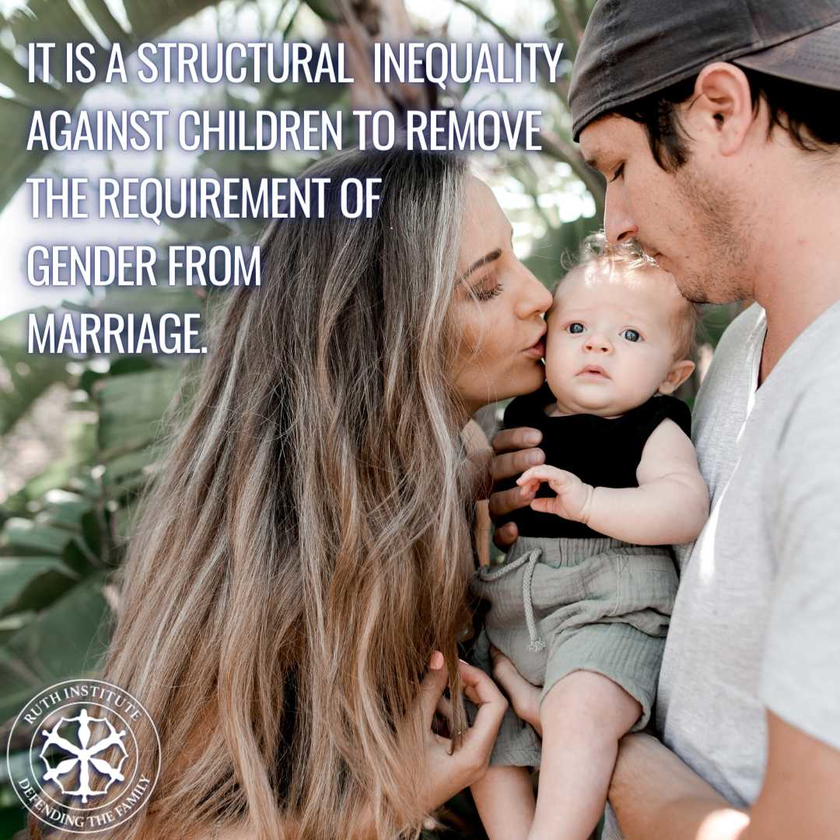Prepared remarks for the Illinois state legislature, hearings on SB 10 Dr Jennifer Roback Morse, founder and president of the Ruth Institute, a project of the National Organization for Marriage
February 26, 2013, Springfield, Illinois. All notes found at the bottom of the article.
I am Dr. Jennifer Roback Morse, founder and president of the Ruth Institute, a project of the National Organization for Marriage. lam the mother of an adopted child, a birth child, and have been a foster parent.
I am honored to be able to address this committee, here in Springfield Illinois, the land of Abraham Lincoln. Ican almost hear his voice and the voices of all the great orators of the American plains, echoing across the ages, their debates on the great issue of their day, the trafficking and enslavement of human beings. I am here to speak about the great issue of our day, the meaning and purpose of marriage, and our obligations to the children of the future.
I urge you to reject the bill before you, SB10. I urge you to reject any other legislation that would redefine the most basic structural feature of marriage, by removing the dual gender requirement for marriage. Redefining marriage redefines parenthood. "Marriage equality" cannot be achieved. Making same sex couples the legal equivalent of opposite sex couples will introduce new and deeper inequalities into society.
Most importantly, redefining marriage creates structural injustices against children. To see this, we must ask ourselves: what is the essential public purpose of marriage, and what is owed to the child?
The essential public purpose of marriage is to attach mothers and fathers to their children and to one another. And the child is entitled to a relationship with and care from both of the people who brought him into being. Therefore, the child has a legitimate interest in the stability of his parents’ union. But no child can defend these entitlements himself. Nor is it adequate to make restitution after these rights have been violated. The child’s rights must be supported pro-actively, before harm is done.
Marriage is adult society’s institutional structure for protecting these legitimate interests of children. Without this public purpose, we would not need marriage at all as a distinct social institution.
We often hear the objection that some marriages don’t have children. This is perfectly true. However, every child has parents. The objection that some marriages don't have children stands the rationale for marriage on its head, viewing marriage from the adult’s perspective, instead of the child’s.
Same sex couples and opposite sex couples are obviously different with respect to this essential public purpose of marriage. And treating different things differently is not discrimination. That is why, in the few cases where courts have found opposite sex marriage to be unlawful discrimination, they have had to come up with purposes for marriage that have nothing to do with procreation or attaching children to parents (1).
Thus, my first and most basic point is this: It is a structural injustice to a child, to deprive him or her of a relationship with both parents, without some compelling or unavoidable reason.
You may have heard some professional organizations claim that same sex couples make perfectly fine parents. However, we have reason to doubt the cheerful optimism that there is no difference between same sex couples and opposite sex couples as parents.
The claims of the American Psychological Association have been shown to be based upon studies with seriously flawed methodology (2).
By contrast, a sophisticated study was recently performed by sociologist Mark Regnerus at the University of Texas at Austin. He used a professional polling company to take a random sample of young adults aged 18-39, who were asked a battery of questions about their current lives, their childhoods, and their families when they were growing up. The nearly 3,000 individuals came from a variety of family forms, including some whose mothers or fathers had ever had a same sex relationship.
This study is superior to previous research because it is a large, random, representative sample. It can potentially show the long term impact of childhood family structure. It asks the young adults themselves about their life experiences, rather than asking mothers about their small children as most previous research has done (3).
This study finds significant differences between the outcomes for children raised in intact biological families and children whose parents ever had same sex relationships.
For instance, children whose mothers had lesbian relationships were more likely to report themselves being on public assistance, being unemployed, and having had an affair (4). These young adults also are more likely to report being depressed, that they felt less secure as children, and that their current relationship is in trouble (5).
These results, while certainly not the final word on the subject, are more than sufficient to disprove the claim that "not a single study has found children of lesbian or gay parents to be disadvantaged."
Over the past fifty years or so, our society has been experimenting with a variety of family structures. We have accumulated mountains of data showing that children do need both their mothers and their fathers, (6) and that fathers make distinct contributions to the well-being of children (7). We already know that every one of these alternative family forms poses real and lasting risks for children. It simply strains the imagination to think that same sex couples will be able to achieve what no other alternative family structure has achieved.
SB10 will commit the state of Illinois to denying these obvious truths. In fact, some courts are already saying things like, ”the traditional notion that children need a mother and a father to be raised into healthy, well-adjusted adults is based more on stereotype than anything else (8)." This statement by the Iowa Supreme Court in Varnum v Brien is simply false as a general statement. Is this committee really prepared to go to neighborhoods on the South Side of Chicago, where children have never seen fathers, and claim that children do NOT need mothers and fathers?
But the impact of same sex parents on the children living with them is not the main problem that redefining marriage presents for children. As of 2005, a mere 4 tenths of one per cent of the total children in the US were living in households headed by same-sex couples (9). The more significant problem is how redefining marriage affects other aspects of the legal and social system.
Redefining marriage redefines parenthood
Same sex marriage redefines parenthood, as a side effect of redefining marriage. Up until now, marriage has made legal parenthood track biological parenthood, with adoption for exceptional situations. The legal presumption of paternity means that children born to a married woman are presumed to be the children of her husband. With this legal rule, and the social practice of sexual exclusivity, marriage attaches children to their biological parents.
Same sex couples of course, do not procreate together. So-called ”Marriage Equality” requires a dubious move from ”presumption of paternity" to the gender neutral ”presumption of parentage.”
This sleight of hand transforms the legal understanding of parenthood since the same sex partner is never the other biological parent. Rather than attaching children to their biological parents, same sex "marriage" is the vehicle that separates children from a parent.
A little girl known to the courts as M.C. was born to a woman in a same sex union in California during the window before Proposition 8 passed. When one woman was incarcerated and the other was hospitalized, M.C. could not be placed with her biological father, even though he was willing and a perfectly fit parent. Why? The women's same sex union required the court to do a gender neutral reading of the Uniform Parentage Act, and presume that the second woman in the union was the little girl's"otherparent." She was placed in foster care, rather than with her father (10).
New inequalities
This brings me to my next point: trying to create "marriage equality'I will introduce a whole new set of inequalities in society. Children like little M.C. have no legally recognized right to a relationship with their fathers. Some children will want to know their missing parent, and will experience this as a great loss (11).
For instance, in France recently, about one million people marched in Paris in favor of man woman marriage. In the run up to that march, a 66 year old man who had been raised by two women, told his story. He said, "I experienced the absence of my father as an amputation (12)." Hence children of same sex couples are not equal to other children.
Likewise, men who provide sperm to lesbian couples are not treated equally with other fathers. Some excluded fathers will want a relationship with their children, which they will be legally denied (13).
Women who give birth to babies inside a same sex union are not treated equally with other mothers. The law treats her legal relationship with another woman as tacit consent for her to become in effect, the child’s adoptive parent.
By contrast, all other mothers who make adoption plans for their children are permitted to change their minds once the baby is born. No state in the union honors an adoption contract made before a child is born. How often do we hear new parents say things like ”I had no idea how I would feel.” Up until now, the law has recognized the strength and uniqueness of the maternal bond. It is only the woman who forms a legal union with another woman who cannot reconsider after her child is born (14).
In all these cases, genderless marriage commits the state to taking sides against the natural parent and in favor of the legally constructed parent.
You have perhaps seen some attractive children of same sex couples, giving their testimony. Someday, those children will be old enough to speak for themselves. Some of them will be less enthused and more conflicted, when they can speak without pressure from the adults around them.
That is why I am reading these things into the record. You may begin to hear testimonials like the one from the French gentleman Iquoted earlier. I don't want you waking up in the middle of the night thirty years from now, wondering whether you should have done more to stop the "inevitable" drive to redefine marriage.
For you see, there is nothing "inevitable" about removing the gender requirement for marriage.
It is not "inevitable" for the state of Illinois making a policy decision to come between children and one of their biological parents. It is not "inevitable" that children have three legal parents on their birth certificates,15 or three or more adults arguing in court over their custody. 15 It is not "inevitable" that we do yet another round of social experimentation on children.
But all of these things ARE inevitable, if you pass SB 10 into law. Once the state of Illinois removes the gender requirement from marriage, the wheels will be set into motion for all these things to come to pass.
The clichés of today will not hold up after years of repetition. Just as "the kids will be fine as long as their parents are happy," is no longer working to excuse the massive divorce problem in this country, so too, "marriage equality" is going to be very thin indeed, as the natural consequences of redefining marriage play themselves out throughout the culture.
Please, I beg you, for the sake of the future children of Illinois, resist the pressure you face today. Vote no on SB 10.
Notes
1) See for instance Judge Vaughn Walker's opinion overturning Proposition 8. He defined the purpose of marriage in this way: ”Marriage is the state recognition and approval of a couple’s choice to live with each other, to remain committed to one another and to form a household based on their own feelings about one another and to join in an economic partnership and support one another and any dependents.” Finding of fact #34, on pg 67.
2) "Not a single study has found children of lesbian or gay parents to be disadvantaged in any significant respect relative to children of heterosexual parents." This quotation is from the American Psychological Association (APA) 2005 Brief on "Lesbian and Gay Parenting." Charlotte Patterson, "Lesbian and Gay parents and their children: summary of research findings," American Psychological Association 2005, pp 5-22, quote on pg 15. However, a recent comprehensive review of the 59 studies that made up the APA's report concluded that every study cited had serious methodological flaws. "Not one of the 59 studies referenced in the 2005 APA Brief compares a large, random, representative sample of lesbian or gay parents and their children, with a large, random, representative sample of married parents and their children." Loren Marks,"Same-sex parenting and children's outcomes: A closer examination of the American psychological association's brief on lesbian and gay parenting," Social Science Research, 41 (2012) 735-751, quote on page 748. This can be viewed here.
To take one particularly noteworthy example of flawed methodology, consider one study by Dr. Charlotte Patterson, who was also the author of the APA Brief. "Recruitment began when I contacted friends, acquaintances and colleagues who might be likely to know eligible lesbian mothers." She recruited a grand total of 26 children. There was no control group of children raised by intact heterosexual married parents. Charlotte Patterson, "Families of the Lesbian baby boom: Parents' division of labor and children's adjustment," Developmental Psychology, 1995, Vol. 31, no. 1, 115-123, quote on page 116.
3) Mark Regnerus, "How different are the adult children of parents who have same-sex relationships? Findings from the New Family Structures Study," Social Science Research, 41 (2012) 752-770.
4lbid, Table 2. This table also shows that these young adults are more likely to report having been sexually touched by a parent or adult caregiver, that they had been forced to have sex against their will, than those who had been brought up in intact biological families. Twenty-three percent of young adults whose mothers had a same sex relationship had been touched sexually by a parent or adult care-giver, compared with 2% of those whose parents were continuously married, 10% of those whose parents were divorced or never married, and 12% of those who lived in a stepfamily. Thirty-one percent of young adults whose mothers had had a same sex relationship and 25% of those whose father had had a same sex relationship reported that they had ever been forced to have sex against their will, compared with 8% of those whose parents were continuously married, 23% of those who had been adopted, 24% of those whose parents had divorced, 16% of those who lived with stepparents and 16% of those whose parents were never married. While 90% of those whose parents were continuously married reported themselves as "entirely heterosexual," only 61% of those whose mother had a same sex relationship and 71% of those whose father had a same sex relationship reported themselves as "entirely heterosexual." Just over 80% of young adults who grew up in all other family forms, including adopted, divorced, stepfamily and never married parents, reported themselves as "entirely heterosexual."
5) Ibid, Table 3.
6) Among the many citations that could be given, ”Why Marriage Matters: 26 Conclusions from the Social Sciences,” (NY: Institute for American Values, 2005), summarizes some of the most important research. See also the studies listed in Table 2 of Loren Marks, op. cit.
7) See David Blankenhorn, "Fatherless America: Confronting Our Most Urgent Social Problem, (New York: Harper, 1996)" for the general overview of the issue. In one study, for instance, father involvement with children was the biggest single predictor of having fewer behavior problems, as important as higher parental education. See ”Parental Involvement and Children’s Behavior Problems," Paul R. Amato and Fernando Rivera, Journal of Marriage and the Family, Volume 61, No. 2 (May 1999), pp. 375-384. Available for purchase here.
8) Varnum v Brien Supreme Court of Iowa, No. 07—1499, Filed April 3, 2009, pg 54, footnote 26
9) According to the Census Snapshot, US, by Adam P. Romero, Amanda K. Baumle, M.V. Lee Badgett, and Gary J. Gates, (Los Angeles: Williams Institute, UCLA, 2007), there were approximately 270,313 children living in households headed by same sex couples. The Williams Institute specializes in demographic and economic research on gay and lesbian populations. According to the American Community Survey, ”General Demographic Characteristics, 2005” there were a total of 73,131,688 persons under the age of 18 In the US In 2005. (Calculated by subtracting total number of persons over 18 (215, 246,449 from total population of 288,378,137.) ---link is broken and no archived version can be found --- http://factfinder.census.gov/servlet/ADPTable?_bm=y&-geo_id=D&-gr_name=ACS_2005_EST_G00_DP1&-ds_name=D&-_lang=en. Dividing the 270,313 children'In households headed by same sex couples by the total number of children under 18 In the US, yields a figure of .00369 which Is the less than 4 tenths of one percent figure quoted in the text.
10) "Why California's Three Parent Law was Inevitable," Jennifer Roback Morse, The Public Discourse, Septemeber 10, 2012, http://www.thepublicdiscourse.com/2012/09/6197/
11) See the many blogs and websites started by Donor Conceived Persons, such as Tangled Webs, Anonymous Us, and We Are Donor Conceived.
12) "Jean-DominiqueBunel :«J'aiétéélevépardeuxfemmes» " First published in Le Figaroon January 10, 2013, reprinted in Chretiente, available at the Web Archive here. English translation can be found at the Web Artchive. Monsieur Bunel has a long and distinguished career of humanitarian service.
13) See for instance, ”Gay Irish sperm donor wins visiting rights to lesbian couple's child,” Irish Central, December 11, 2009; The In re M.C. case arose in part because the biological father came forward to try to care for his daughter after the birth mother went to jail for accessory to attempted murder of her former partner. "Why California's Three Parent Bill was Inevitable," The Public Discourse, September 10, 2012.
14) This is probably a factor in the drama in the background of the In Re M.C. case. It is surely a factor in the celebrated Miller-Jenkins custody dispute "FBI arrests Tenn. Pastor In Vt.-VA custody case,’’ Sign On San Diego, April 22, 2011. htt :
casez ”Vermont: ruling'In Lesbian Custody Case,” New York Times, January 22,2010.
15) ”Pennsylvania Court finds three Adults Can Have Parental Rights,” Web Archive Link (quoting Superior Court case, JacobvShultz—Jacob, 2007 Westlaw 1240885, 2007 PA Super 118), ”Canadian court rules boy has a dad and two moms,” from the Web Archive, here.
16) For a Canadian case involving three parents see here. For a British case involving four parents, see here.




















